
Unleashing the Brilliance Within - Nurturing Cognitive Skills in Toddlers
Unleashing the Brilliance Within - Nurturing Cognitive Skills in Toddlers
The toddler stage is a time of incredible growth and development, especially when it comes to cognitive skills. Cognitive skills refer to the mental processes that enable toddlers to learn, think, reason, and problem-solve. These skills lay the foundation for future academic success and overall intellectual development. In this blog, we will explore the importance of cognitive skills in toddlers, discuss the different aspects of cognitive development, and provide practical strategies to nurture and stimulate cognitive growth during this critical phase.
Cognitive skills are fundamental for toddlers as they explore and make sense of the world around them. These skills involve thinking, problem-solving, memory, attention, and reasoning.
Here are some important cognitive skills that toddlers typically develop during their early years:
1. Object Permanence:
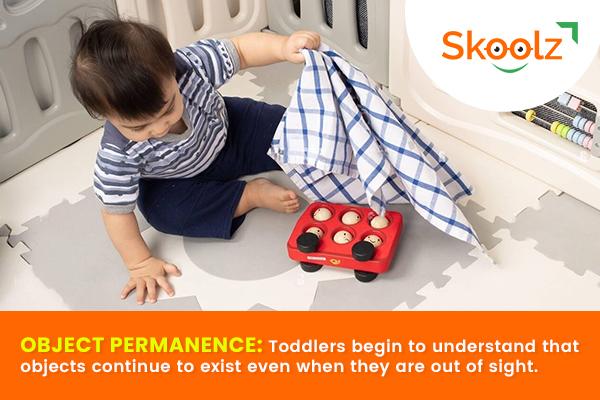
Toddlers begin to understand that objects continue to exist even when they are out of sight. This is an important cognitive milestone that helps them develop memory and reasoning abilities.
2. Cause and Effect:
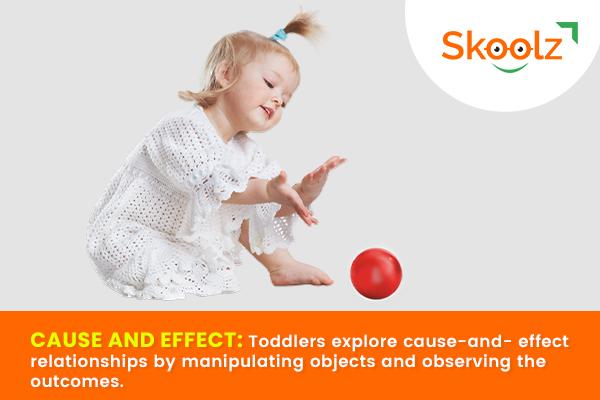
Toddlers explore cause-and-effect relationships by manipulating objects and observing the outcomes. They learn that their actions can have consequences, which contributes to their problem-solving skills.
3. Problem-Solving:
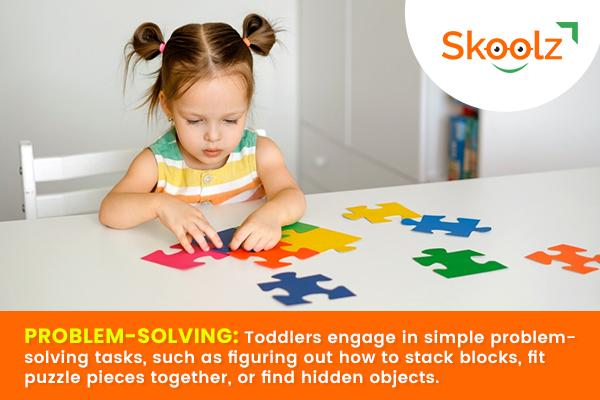
Toddlers engage in simple problem-solving tasks, such as figuring out how to stack blocks, fit puzzle pieces together, or find hidden objects. Encourage their problem-solving abilities by providing age-appropriate challenges and puzzles.
4. Symbolic Play:
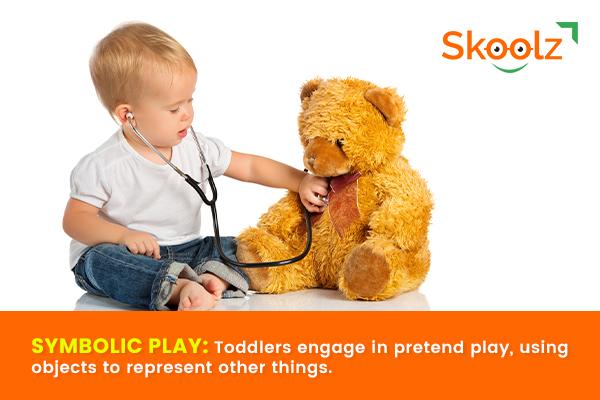
Toddlers engage in pretend play, using objects to represent other things. This type of play enhances their imagination, creativity, and symbolic thinking skills.
5. Memory Development:
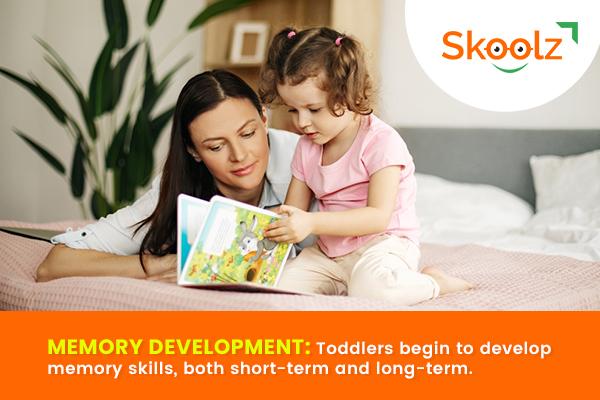
Toddlers begin to develop memory skills, both short-term and long-term. They remember familiar people, objects, and routines and can recall recent events or experiences.
6. Attention Span:
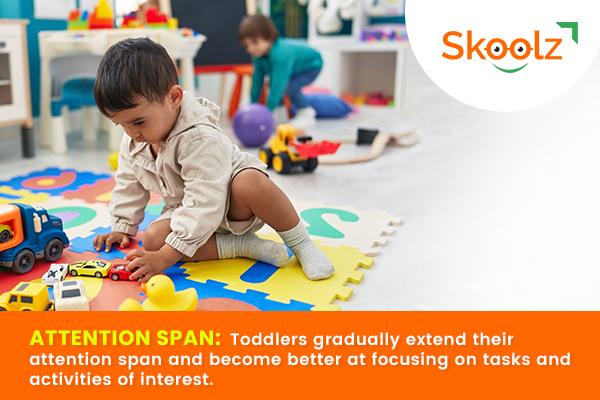
Toddlers gradually extend their attention span and become better at focusing on tasks and activities of interest. Offer engaging and age-appropriate activities to help them practice and develop their attention skills.
7. Classification and Sorting:
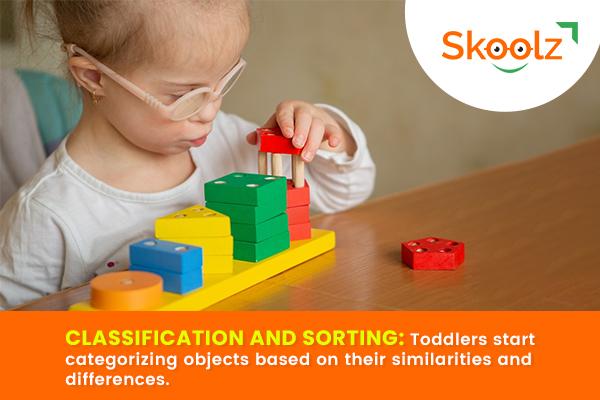
Toddlers start categorizing objects based on their similarities and differences. They sort objects by shape, size, color, and other attributes, developing their ability to classify and make logical connections.
8. Spatial Awareness:
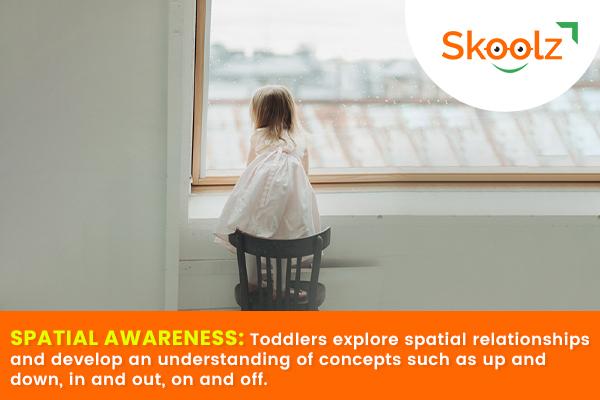
Toddlers explore spatial relationships and develop an understanding of concepts such as up and down, in and out, on and off. They begin to solve simple spatial puzzles, stack objects, and navigate their environment.
9. Imitation and Observation:
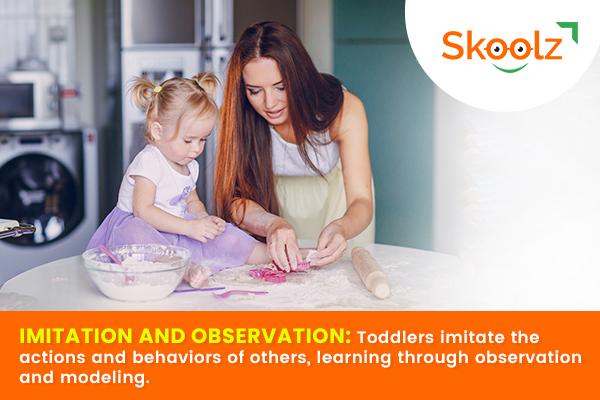
Toddlers imitate the actions and behaviors of others, learning through observation and modeling. They observe and mimic gestures, actions, and social interactions, which helps them develop new skills.
10. Numeracy Skills:
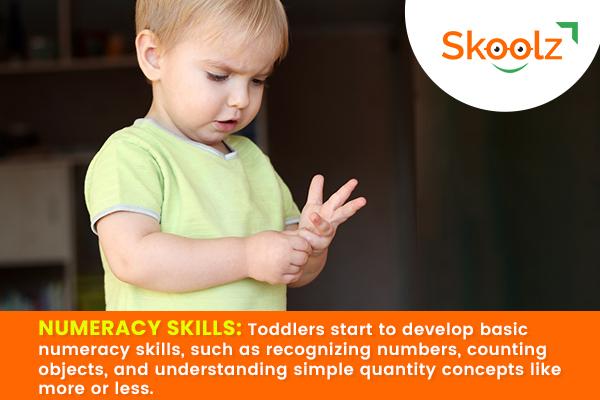
Toddlers start to develop basic numeracy skills, such as recognizing numbers, counting objects, and understanding simple quantity concepts like more or less.
Encourage cognitive development in toddlers by providing a stimulating environment, engaging in interactive play, offering age-appropriate toys and activities, and fostering opportunities for exploration and problem-solving. Remember that each child develops at their own pace, so provide patience, support, and appropriate challenges as they progress through these cognitive milestones.
The Significance of Cognitive Skills in Toddlers:
Cognitive skills play a fundamental role in a toddler's overall development, impacting various areas of their life:
1. Language and Communication:
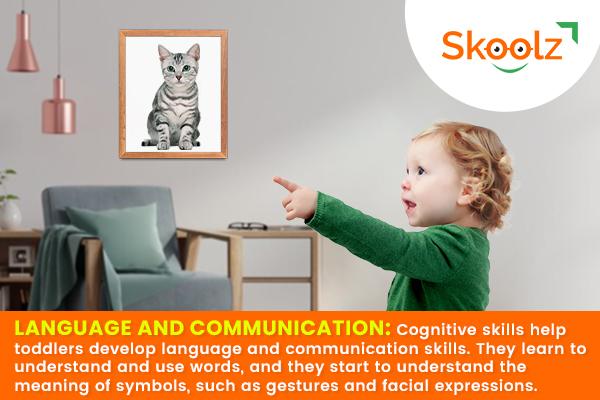
Cognitive skills are closely intertwined with language development. Toddlers use cognitive abilities to understand and produce speech, build vocabulary, and comprehend the meaning of words and sentences. Developing cognitive skills enhances their ability to express themselves and engage in meaningful communication.
2. Problem-Solving and Critical Thinking:
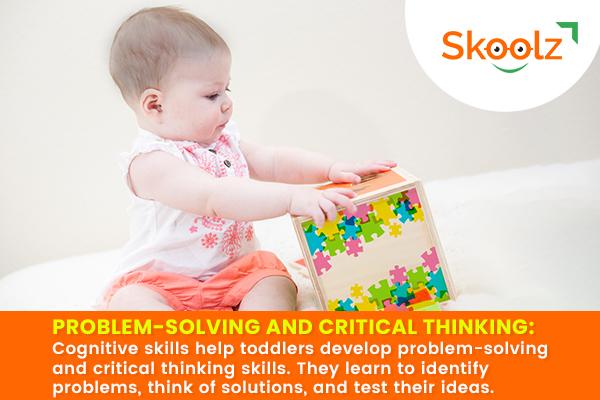
Cognitive skills foster problem-solving abilities in toddlers. They learn to analyze situations, think critically, and find solutions. Through cognitive development, toddlers gain the capacity to approach challenges with creativity and adaptability, developing important life skills.
3. Memory and Recall:
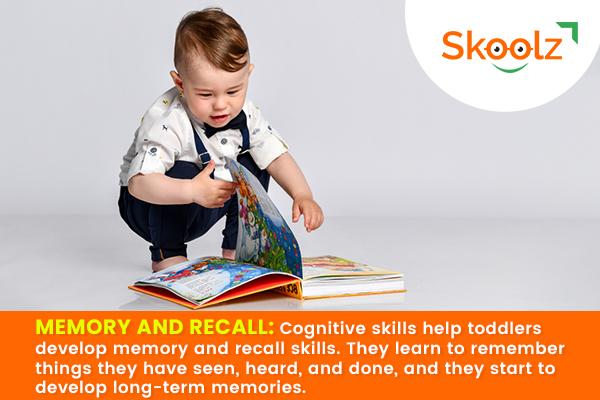
Cognitive skills play a significant role in memory development. Toddlers' ability to remember and recall information, events, and experiences strengthens their learning capabilities. Improved memory allows them to make connections, build knowledge, and expand their understanding of the world.
4. Attention and Concentration:
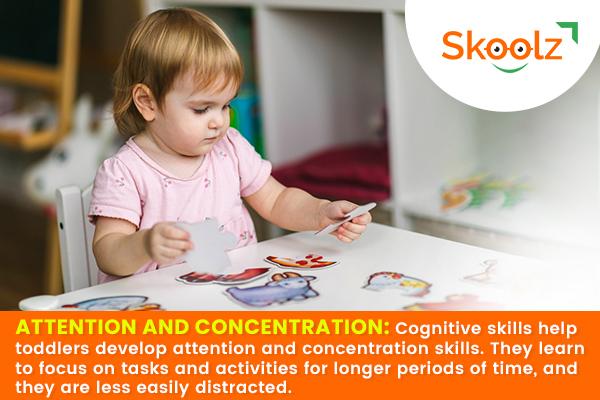
Cognitive skills enable toddlers to focus their attention and sustain concentration on tasks. As they develop cognitive abilities, toddlers become more adept at filtering distractions and maintaining attention, enhancing their learning potential.
5. Spatial Awareness and Conceptual Thinking:
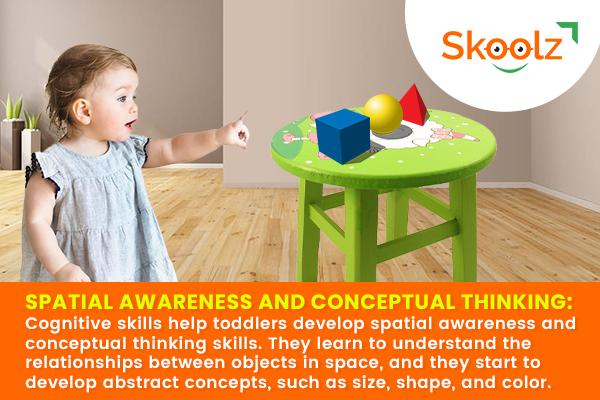
Cognitive development nurtures spatial awareness and conceptual thinking in toddlers. They learn to understand spatial relationships, visualize objects and their positions, and develop a sense of perspective. These skills lay the foundation for mathematical and scientific thinking.
Strategies to Nurture Cognitive Skills in Toddlers:
Here are some effective strategies to support and stimulate cognitive development in toddlers:
1. Engage in Imaginative Play:
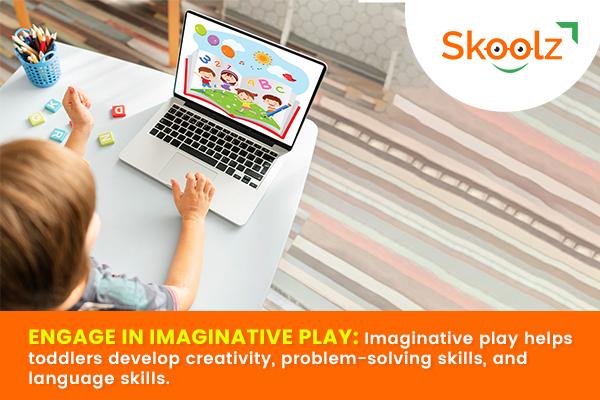
Encourage toddlers to engage in pretend play, where they can use their imagination and creativity. Provide props, dress-up clothes, and pretend scenarios to foster cognitive skills such as problem-solving, language development, and conceptual thinking.
2. Read and Explore Books:
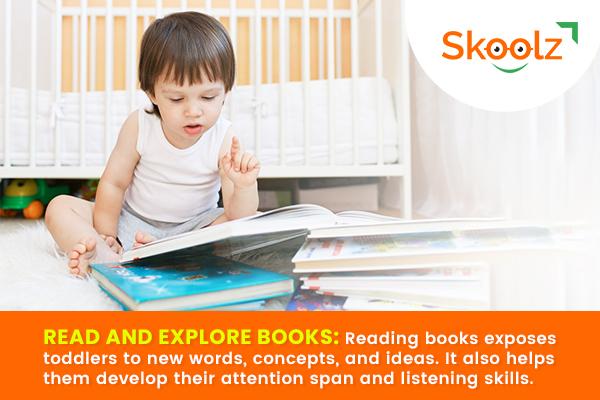
Read to toddlers regularly and engage them in interactive discussions about the stories. Ask open-ended questions to encourage critical thinking, predict outcomes, and stimulate their imagination. Choose books that introduce new concepts, vocabulary, and cognitive challenges.
3. Provide Age-Appropriate Puzzles and Games:
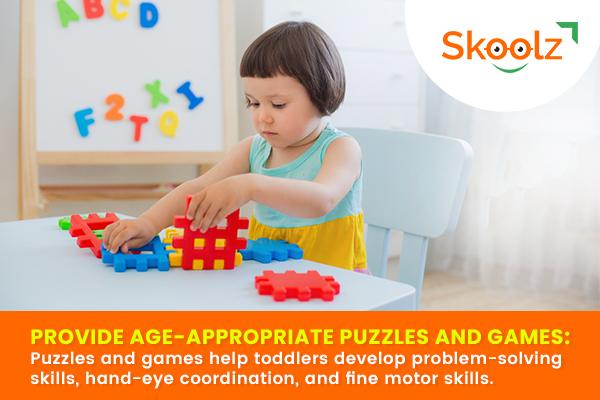
Introduce puzzles and games that require toddlers to problem-solve, match shapes, and sequence objects. Start with simple puzzles and gradually increase the complexity as their cognitive skills develop. Games like memory matching and sorting activities can also be beneficial.
4. Encourage Sensory Play:
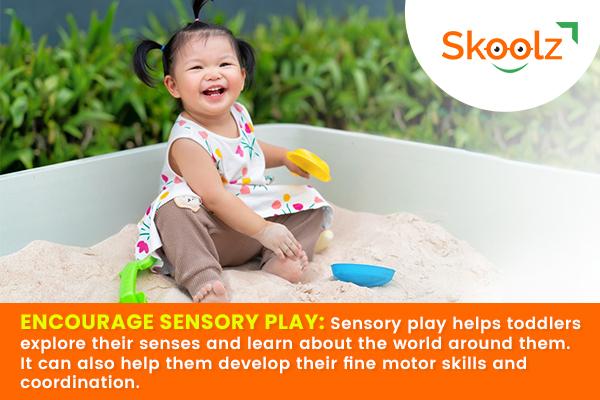
Sensory play activities, such as playing with sand, water, or sensory bins, stimulate cognitive skills while engaging multiple senses. These activities encourage exploration, problem-solving, and language development as toddlers describe the sensory experiences.
5. Foster Curiosity and Exploration:
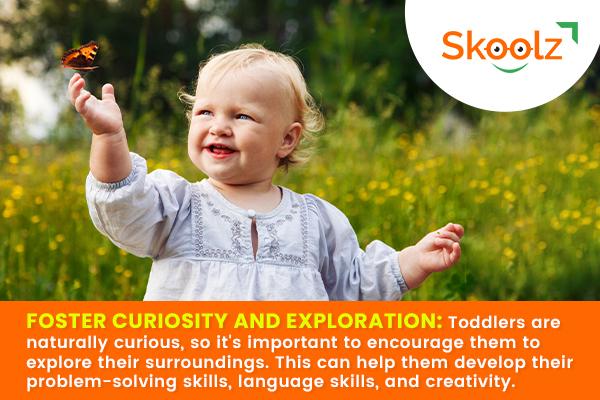
Create an environment that sparks curiosity and encourages exploration. Provide opportunities for toddlers to observe nature, experiment with objects, and ask questions. Encourage their natural curiosity by providing answers, engaging in conversations, and supporting their investigations.
6. Music and Rhymes:
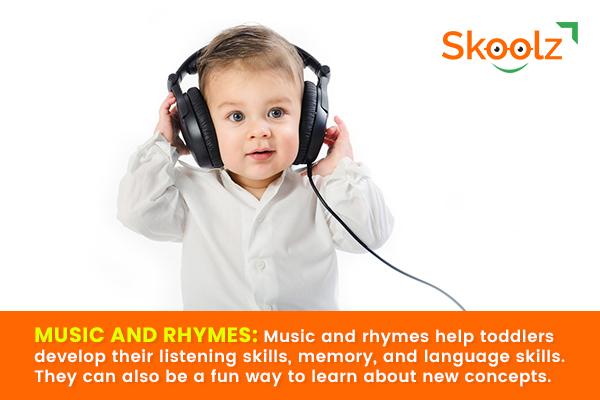
Engage toddlers in musical activities, singing songs and reciting rhymes. Music stimulates cognitive skills, language development, and memory recall. Encourage toddlers to participate, clap hands, and move to the rhythm, fostering cognitive and physical coordination.
7. Offer Open-Ended Toys and Materials:
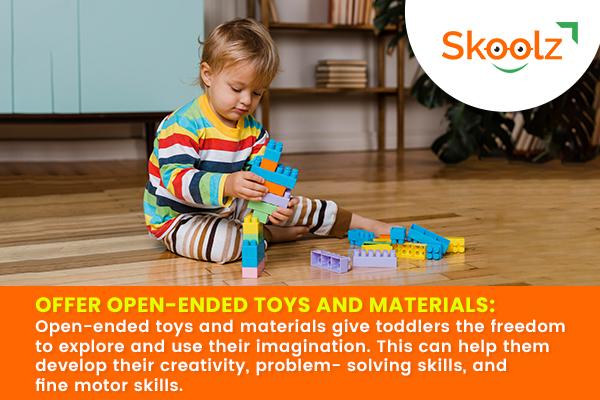
Provide open-ended toys and materials that encourage creativity and problem-solving. Building blocks, art supplies, and construction toys allow toddlers to explore, experiment, and exercise their cognitive skills.
Conclusion: Nurturing cognitive skills in toddlers is a fascinating and rewarding journey. By providing a stimulating and supportive environment, engaging in purposeful play, and offering age-appropriate challenges, parents and caregivers can foster cognitive development in their little ones. Embrace the joy of watching their minds expand, their language flourish, and their problem-solving abilities soar as they embark on a lifelong adventure of learning and discovery.
Disclaimer: The information in the blogs is intended to offer general guidance on various aspects of toddler development. However, it is essential to note that every child is unique, and individual circumstances may vary. The content in our blogs should not be considered a substitute for professional medical advice. If you observe any critical symptoms or have specific concerns about your child's health, we strongly advise consulting with a qualified pediatrician. We do not assume any responsibility or liability for actions taken based on the information provided. Always seek the expertise of a medical professional for any specific concerns or medical attention your child may require. By accessing our toddler blogs, you acknowledge the importance of consulting with a pediatrician for any critical symptoms or concerns.
 Written by:
Written by:
Swati Sahu
Digital Marketer

Unleashing the Brilliance Within - Nurturing Cognitive Skills in Toddlers
The toddler stage is a time of incredible growth and development, especially when it comes to cognitive skills. Cognitive skills refer to the mental processes that enable toddlers to learn, think, reason, and problem-solve. These skills lay the foundation for future academic success and overall intellectual development. In this blog, we will explore the importance of cognitive skills in toddlers, discuss the different aspects of cognitive development, and provide practical strategies to nurture and stimulate cognitive growth during this critical phase.
Cognitive skills are fundamental for toddlers as they explore and make sense of the world around them. These skills involve thinking, problem-solving, memory, attention, and reasoning.
Here are some important cognitive skills that toddlers typically develop during their early years:
1. Object Permanence:

Toddlers begin to understand that objects continue to exist even when they are out of sight. This is an important cognitive milestone that helps them develop memory and reasoning abilities.
2. Cause and Effect:

Toddlers explore cause-and-effect relationships by manipulating objects and observing the outcomes. They learn that their actions can have consequences, which contributes to their problem-solving skills.
3. Problem-Solving:

Toddlers engage in simple problem-solving tasks, such as figuring out how to stack blocks, fit puzzle pieces together, or find hidden objects. Encourage their problem-solving abilities by providing age-appropriate challenges and puzzles.
4. Symbolic Play:

Toddlers engage in pretend play, using objects to represent other things. This type of play enhances their imagination, creativity, and symbolic thinking skills.
5. Memory Development:

Toddlers begin to develop memory skills, both short-term and long-term. They remember familiar people, objects, and routines and can recall recent events or experiences.
6. Attention Span:

Toddlers gradually extend their attention span and become better at focusing on tasks and activities of interest. Offer engaging and age-appropriate activities to help them practice and develop their attention skills.
7. Classification and Sorting:

Toddlers start categorizing objects based on their similarities and differences. They sort objects by shape, size, color, and other attributes, developing their ability to classify and make logical connections.
8. Spatial Awareness:

Toddlers explore spatial relationships and develop an understanding of concepts such as up and down, in and out, on and off. They begin to solve simple spatial puzzles, stack objects, and navigate their environment.
9. Imitation and Observation:

Toddlers imitate the actions and behaviors of others, learning through observation and modeling. They observe and mimic gestures, actions, and social interactions, which helps them develop new skills.
10. Numeracy Skills:

Toddlers start to develop basic numeracy skills, such as recognizing numbers, counting objects, and understanding simple quantity concepts like more or less.
Encourage cognitive development in toddlers by providing a stimulating environment, engaging in interactive play, offering age-appropriate toys and activities, and fostering opportunities for exploration and problem-solving. Remember that each child develops at their own pace, so provide patience, support, and appropriate challenges as they progress through these cognitive milestones.
The Significance of Cognitive Skills in Toddlers:
Cognitive skills play a fundamental role in a toddler's overall development, impacting various areas of their life:
1. Language and Communication:

Cognitive skills are closely intertwined with language development. Toddlers use cognitive abilities to understand and produce speech, build vocabulary, and comprehend the meaning of words and sentences. Developing cognitive skills enhances their ability to express themselves and engage in meaningful communication.
2. Problem-Solving and Critical Thinking:

Cognitive skills foster problem-solving abilities in toddlers. They learn to analyze situations, think critically, and find solutions. Through cognitive development, toddlers gain the capacity to approach challenges with creativity and adaptability, developing important life skills.
3. Memory and Recall:

Cognitive skills play a significant role in memory development. Toddlers' ability to remember and recall information, events, and experiences strengthens their learning capabilities. Improved memory allows them to make connections, build knowledge, and expand their understanding of the world.
4. Attention and Concentration:

Cognitive skills enable toddlers to focus their attention and sustain concentration on tasks. As they develop cognitive abilities, toddlers become more adept at filtering distractions and maintaining attention, enhancing their learning potential.
5. Spatial Awareness and Conceptual Thinking:

Cognitive development nurtures spatial awareness and conceptual thinking in toddlers. They learn to understand spatial relationships, visualize objects and their positions, and develop a sense of perspective. These skills lay the foundation for mathematical and scientific thinking.
Strategies to Nurture Cognitive Skills in Toddlers:
Here are some effective strategies to support and stimulate cognitive development in toddlers:
1. Engage in Imaginative Play:

Encourage toddlers to engage in pretend play, where they can use their imagination and creativity. Provide props, dress-up clothes, and pretend scenarios to foster cognitive skills such as problem-solving, language development, and conceptual thinking.
2. Read and Explore Books:

Read to toddlers regularly and engage them in interactive discussions about the stories. Ask open-ended questions to encourage critical thinking, predict outcomes, and stimulate their imagination. Choose books that introduce new concepts, vocabulary, and cognitive challenges.
3. Provide Age-Appropriate Puzzles and Games:

Introduce puzzles and games that require toddlers to problem-solve, match shapes, and sequence objects. Start with simple puzzles and gradually increase the complexity as their cognitive skills develop. Games like memory matching and sorting activities can also be beneficial.
4. Encourage Sensory Play:

Sensory play activities, such as playing with sand, water, or sensory bins, stimulate cognitive skills while engaging multiple senses. These activities encourage exploration, problem-solving, and language development as toddlers describe the sensory experiences.
5. Foster Curiosity and Exploration:

Create an environment that sparks curiosity and encourages exploration. Provide opportunities for toddlers to observe nature, experiment with objects, and ask questions. Encourage their natural curiosity by providing answers, engaging in conversations, and supporting their investigations.
6. Music and Rhymes:

Engage toddlers in musical activities, singing songs and reciting rhymes. Music stimulates cognitive skills, language development, and memory recall. Encourage toddlers to participate, clap hands, and move to the rhythm, fostering cognitive and physical coordination.
7. Offer Open-Ended Toys and Materials:

Provide open-ended toys and materials that encourage creativity and problem-solving. Building blocks, art supplies, and construction toys allow toddlers to explore, experiment, and exercise their cognitive skills.
Conclusion: Nurturing cognitive skills in toddlers is a fascinating and rewarding journey. By providing a stimulating and supportive environment, engaging in purposeful play, and offering age-appropriate challenges, parents and caregivers can foster cognitive development in their little ones. Embrace the joy of watching their minds expand, their language flourish, and their problem-solving abilities soar as they embark on a lifelong adventure of learning and discovery.
Disclaimer: The information in the blogs is intended to offer general guidance on various aspects of toddler development. However, it is essential to note that every child is unique, and individual circumstances may vary. The content in our blogs should not be considered a substitute for professional medical advice. If you observe any critical symptoms or have specific concerns about your child's health, we strongly advise consulting with a qualified pediatrician. We do not assume any responsibility or liability for actions taken based on the information provided. Always seek the expertise of a medical professional for any specific concerns or medical attention your child may require. By accessing our toddler blogs, you acknowledge the importance of consulting with a pediatrician for any critical symptoms or concerns.
 Written by:
Written by:
Swati Sahu
Digital Marketer




